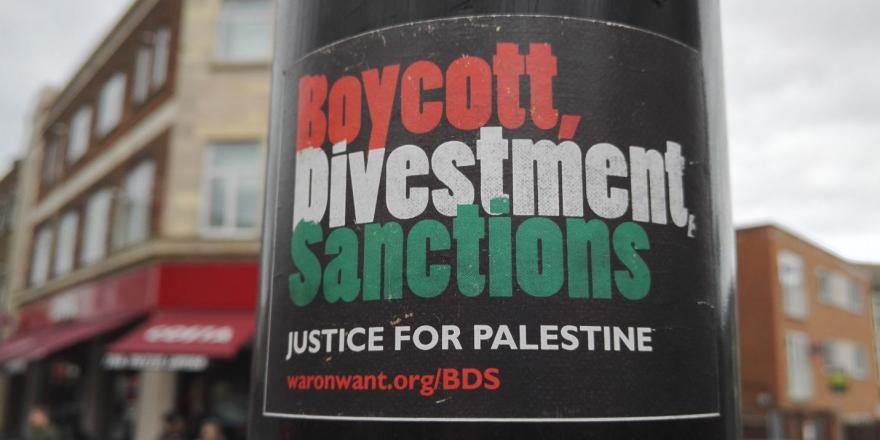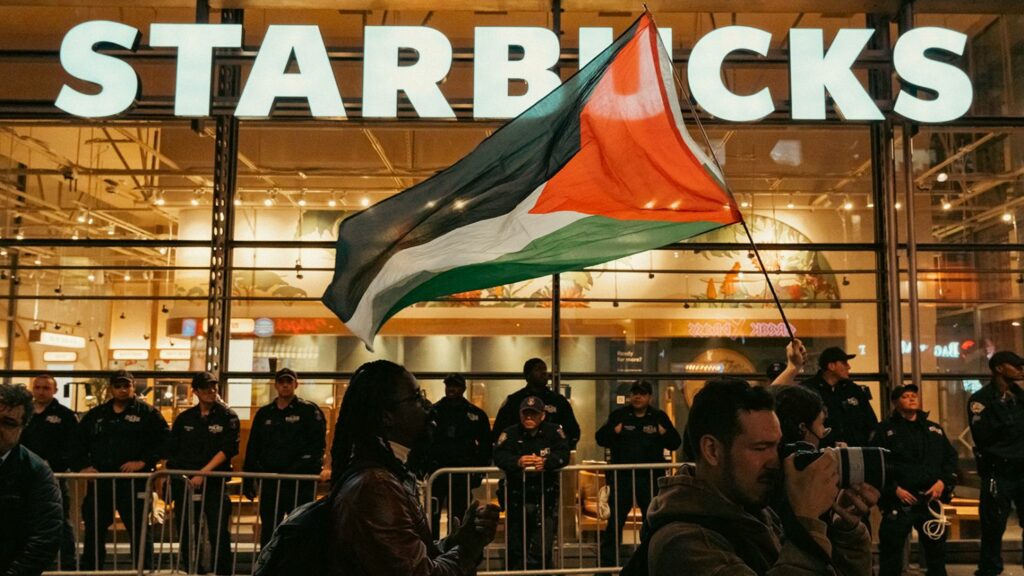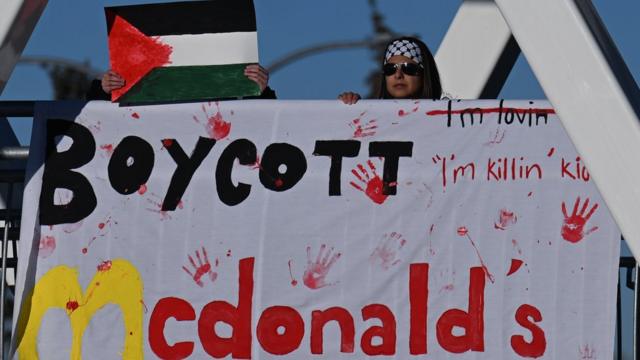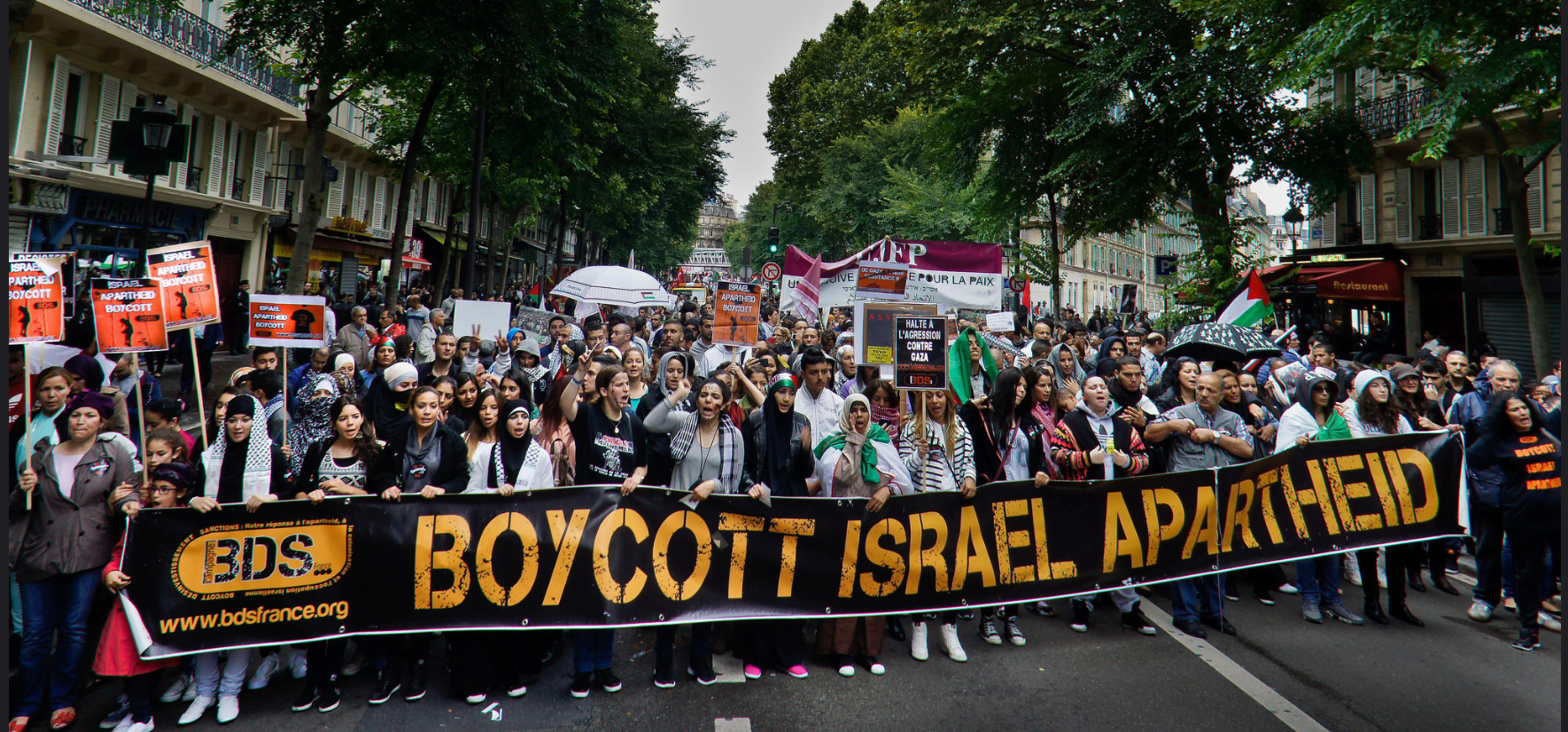A video with a robust message aimed to raise awareness among the masses about the impact that economic boycotts can have, and a call to boycott companies that are funding and sponsoring genocide in Palestine surfaced online some weeks ago. The video traces the journey of cash flow at the outset, eventually reaching the hands of those companies funding, aiding and supporting the ongoing genocide in Gaza. These companies from Starbucks to McDonald’s, directly or indirectly benefit the Israeli colonial project in Palestine.
Mcdonald’s for instance, provided meals for the Israeli Defence Forces (IDF) soldiers who have been constantly bombarding, killing and airstricking Palestinian children, women and men in Gaza. But Starbucks and McDonald’s are not the only companies that have enabled and sustained Israel’s unlawful actions in Palestine and are not the only ones who have met with the outrage of the boycotters.
The gist of the video on boycott is that even a small amount of money that you pay to buy a can of soft drink percolates into millions of dollars which are eventually used to fund the genocide of Palestinians. Mohammad Al-Nass, the creator of the video told Al Jazeera, that they wanted to do something for Palestine and had many ideas for content creation but the primary one was to show “how money, even a small fraction can contribute in the killing of Palestinians.” The video emerged as an eye opener for most people with rhetorics like “What can one can of coke do?”
But boycotting is not a new movement and a form of resistance. It has been there globally for many years making the masses aware and putting pressure on the governments and larger companies to sanction the companies and organisations supporting Israel’s genocidal campaign in Palestine.
What is the BDS Movement?
Inspired by the South African Anti-Apartheid movement, Boycott, Divestment and Sanctions (BDS) is a non-violent movement aimed to impact and disrupt the Israeli apartheid and settler colonial project in Palestine through economic and cultural boycotts. It was launched in 2005 by Human rights activists Omar Bhargoutii and Ramy Shaath. After years of groundbreaking work, the movement is now global with various organisations, Institutions, academics, and nations supporting the movement.

According to the BDS movement “Israel maintains a regime of settler colonialism, apartheid and occupation over the Palestinian people. This is only possible because of international support. Governments fail to hold Israel to account, while corporations and institutions across the world help Israel to oppress Palestinians. Because those in power refuse to act to stop this injustice, Palestinian civil society has called for a global citizens’ response of solidarity with the Palestinian struggle for freedom, justice and equality.”
So what is BDS? Boycott, divestment and sanctions is a strategic and pragmatic project to disrupt Isreal’s anti-apartheid and seller colonial project in Palestine and also cease the international support towards the inhumane and anti-human rights activities and actions of Israel which are in dire contravention to UN’s resolutions on Palestine as well as the International Law. To prove that Israel’s ongoing actions in Palestine are a violation of international law and resolutions and are genocidal the case against Israel is currently ongoing in the UN’s International Court of Justice.
Boycott is a strategic way to withdraw support from Israel’s apartheid and zionist ideology through cultural, academic, and sporting events, among others. In addition, withdrawing support from all international organisations and companies by not buying their products that directly fund Israeli apartheid designs. Divestment on the other hand urges “banks, local councils, churches, pension funds and universities to withdraw investments from the State of Israel and all Israeli and international companies that sustain Israeli apartheid.” Lastly, sanctions are to pressure governments around the globe to not aid and provide any support who directly support and spend huge amounts of money like the USA or indirectly through trade deals, arms and weaponry deals support Isreal like India, UAE etc
The impact of the economic boycott so far
Various companies along with Starbucks and McDonald’s have had a setback due to the ongoing Israeli war on Palestine killing more than 30000 Palestinians including women and children.

According to the UN “Every day the war in Gaza continues, at the current rate, an average of 63 women will continue to be killed.” With the growing number of killings in Gaza, the call for a ceasefire and boycott is also growing. Companies like Unilever, Burger King, Pepsico, Marks and Spenser, Zara, etc are also some of the targets on the BDS list.
Starbucks faced a huge backlash during the protests as well with protestors sloganeering to call out the coffee establishment. The company did face a considerable blow trying to sustain and maintain its image even while being directly pointed out during protesters and social media boycott calls. The company is currently firing about 2000 staff members in the Middle East because of the boycotts.
According to the Associated Press “The Middle East franchisee of Starbucks said Tuesday it has begun firing around 2,000 workers at its coffee shops across the region after the brand found itself targeted by activists during the ongoing Israel-Hamas war in the Gaza Strip.”
The Kuwait-based group, which owns the franchise of Starbucks along with Shak Shak, H&M etc, said in a statement: “As a result of the continually challenging trading conditions over the last six months, we have taken the sad and very difficult decision to reduce the number of colleagues in our Starbucks MENA stores.”
While the burger brand McDonald’s blames the Isreal war on Gaza for missing their sales target. Al Jazeera reports, “McDonald’s CEO Chris Kempczinski said on Monday that the war had had a “disheartening” effect on sales in Middle Eastern countries and other Muslim-majority nations such as Malaysia and Indonesia.”
According to TRT World, Coca-Cola’s stock has also dropped by 7 per cent. The beverage company said, “Tensions in the Middle East have led to some ‘shifts in consumer behaviour‘.” Some other brands that were impacted were Nestle, dominos Etc.
Due to the protests and boycotts many people around the world have started to use and utilise their homegrown products safe under BDS provision. For instance, a soft drink brand in Egypt called Spiro Spathis – a 100-year-old soft drink in Egypt is having a comeback according to a report by Al Jazeera.
Al Jazeera reports, “Now, thanks to a nationwide campaign to boycott Western producers supportive of Israel, the century-old brand is causing a stir as the poster child for Egyptian solidarity with Palestinians. The company is also recruiting due to huge demand; Spiro Spathis has gone on a recruitment drive and received more than 15,000 applicants for jobs it advertised to try to meet the demand.“

However, BDS is not the only movement that targets and calls out companies and organisations funding Israel. The UN also listed several companies with ties to Israeli settlements considered illegal according to international law. According to the UN statement, “In an interim report (A/HRC/37/39) presented to the Human Rights Council in March 2018 by the then High Commissioner, Zeid Ra’ad Al Hussein, the UN Human Rights Office noted it had reviewed information that was publicly available or had been received from a variety of sources, about an initial 307 companies. After further research, the total number reviewed increased to 321. Of these, a total of 206 companies were considered for further assessment.”
In addition Human Rights Council recently passed a resolution calling “to cease the sale, transfer and diversion of arms, munitions and other military equipment to Israel, the occupying Power…to prevent further violations of international humanitarian law and violations and abuses of human rights.”
Economic boycotts do have a considerable impact on the companies and many companies have had to shut down or review their actions in the past also. The ongoing boycott of Israeli products and companies as well as companies and organisations aiding and supporting Israel’s inhuman actions, does have a major impact on the ongoing actions of Israeli companies and others.
According to, Al Jazeera, “Prime Minister Anwar Ibrahim’s office also announced in December that all Israeli-owned, Israeli-flagged or Israel-destined ships are banned from its docks. The country has no diplomatic ties with Israel.” Not only people, but even countries are rallying to take action to boycott Israeli goods and companies leaving such companies with dire consequences and major blow.
About the author(s)
Shahinda is a multimedia journalist with an experience of more than five years. She has an interest in covering politics, gender, conflict, and gender-based violence/crime. In addition, she has experience in reporting, photography and documentary filmmaking. She has done her Masters in Mass Communication from AJK MCRC Jamia Millia Islamia, New Delhi.





